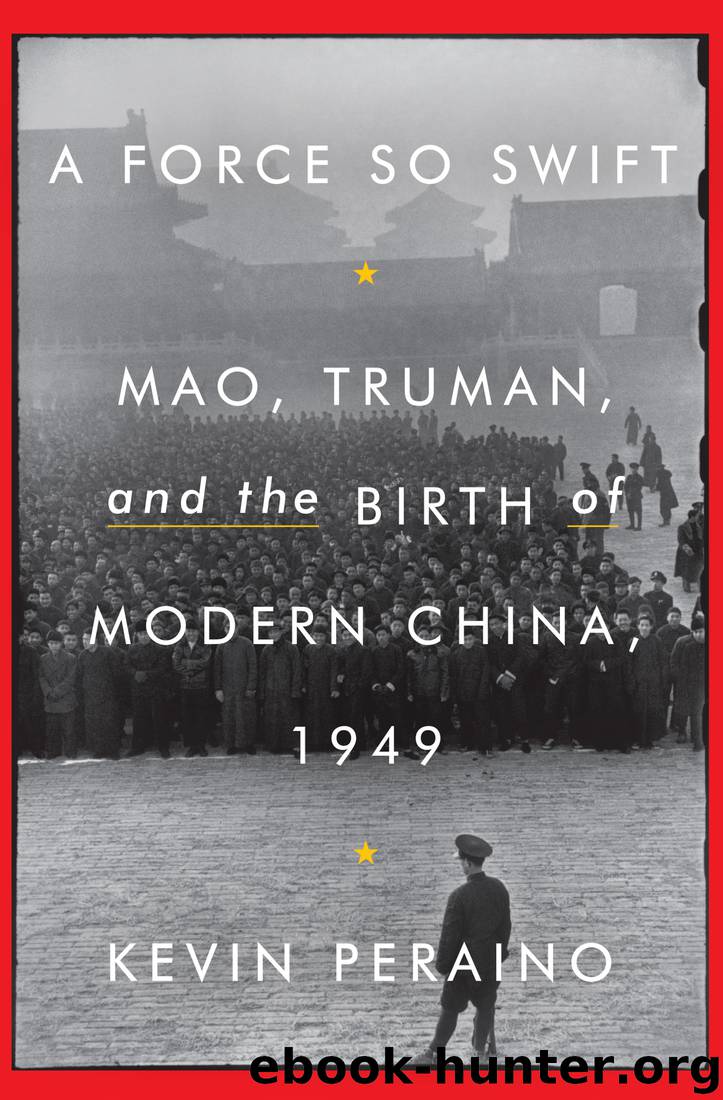A Force So Swift: Mao, Truman, and the Birth of Modern China, 1949 by Kevin Peraino

Author:Kevin Peraino [Peraino, Kevin]
Language: eng
Format: mobi
Tags: politics, history
ISBN: 9780307887238
Publisher: Crown
Published: 2017-09-19T04:00:00+00:00
17
NO DEVIL SHALL ESCAPE
On the morning of August 17, in the free moments before his regular staff meeting, Truman peered down at a number of weather maps that he had unrolled onto his desk. For more than three decades, predicting the weather had been a sort of hobby for the president. He liked to study the data—the positions of the warm and cold fronts, the height and type of the cloud cover—and then make his best guess about what would happen next. As 1949 rolled on, he grew increasingly competitive about his forecasts, sometimes challenging staff members and reporters to petty wagers. Pulling stacks of maps from his alligator-leather briefcase, he would offer eighty-to-one odds that his opponents could not outguess him.
For Truman, it must have been a reassuring parlor game: an affirmation of his power to foresee the essentially unforeseeable. All year he had been struggling with the tension between the things he could control on the world stage, and the things that seemed to control him. With the White Paper, he had acknowledged that Mao’s revolution was ultimately beyond his influence. And yet the document, with its merciless indictment of Chiang, was itself an attempt to shape an outcome. Truman, despite his caution, could never bring himself to completely abandon his efforts to bring order to what he viewed as an increasingly disorderly East Asia.
Even if he had wanted to forget about China, Truman’s political opponents—men like Walter Judd—would not let him. Judd, after all, shared the president’s desire to control the weather—and then some. But their days barnstorming the Midwest together, pushing their ambitious proposals to heal the world, were long past. Now, infuriated over the publication of the White Paper, Judd unloaded on his old friend. On August 17, on the floor of the House, the Minnesota congressman launched into a vicious attack on the administration. He argued that it was still possible—and necessary—for the United States to fight back against Mao. Past American statesmen, he insisted, had long recognized the importance of keeping China “in the hands of friends and not under the control of some nation hostile to us.” Truman was standing up to Stalin in Europe, Judd argued; why wasn’t he doing the same in Asia? “I have never been able to understand why we cannot get a policy that makes sense in both oceans at the same time,” he said. Judd urged his colleagues to reverse the president’s approach, shifting the strategy “from appease to oppose.”
As Judd pushed publicly for more vigorous action, he met privately with key legislators to try to secure the funding. Judd wanted John Davis Lodge, the Connecticut congressman, to slip an amendment providing aid to China into an existing bill to bankroll military assistance to European nations. Judd thought the program should be modeled after the Greek aid package that Truman had approved two years before. He was not asking for “all-out intervention on a major scale with American troops,” Judd said, but rather “limited American military
Download
This site does not store any files on its server. We only index and link to content provided by other sites. Please contact the content providers to delete copyright contents if any and email us, we'll remove relevant links or contents immediately.
| Africa | Americas |
| Arctic & Antarctica | Asia |
| Australia & Oceania | Europe |
| Middle East | Russia |
| United States | World |
| Ancient Civilizations | Military |
| Historical Study & Educational Resources |
Cat's cradle by Kurt Vonnegut(15339)
Pimp by Iceberg Slim(14489)
4 3 2 1: A Novel by Paul Auster(12377)
Underground: A Human History of the Worlds Beneath Our Feet by Will Hunt(12090)
The Radium Girls by Kate Moore(12018)
Wiseguy by Nicholas Pileggi(5770)
The Fire Next Time by James Baldwin(5432)
Perfect Rhythm by Jae(5398)
American History Stories, Volume III (Yesterday's Classics) by Pratt Mara L(5301)
Paper Towns by Green John(5179)
Pale Blue Dot by Carl Sagan(4996)
A Higher Loyalty: Truth, Lies, and Leadership by James Comey(4954)
The Mayflower and the Pilgrims' New World by Nathaniel Philbrick(4495)
The Doomsday Machine by Daniel Ellsberg(4485)
Killers of the Flower Moon: The Osage Murders and the Birth of the FBI by David Grann(4437)
The Sympathizer by Viet Thanh Nguyen(4385)
Too Much and Not the Mood by Durga Chew-Bose(4338)
The Borden Murders by Sarah Miller(4313)
Sticky Fingers by Joe Hagan(4188)
